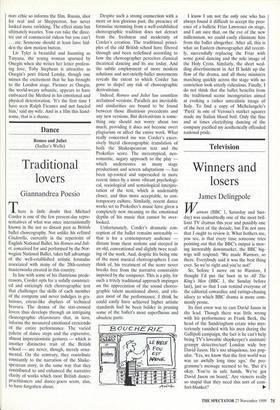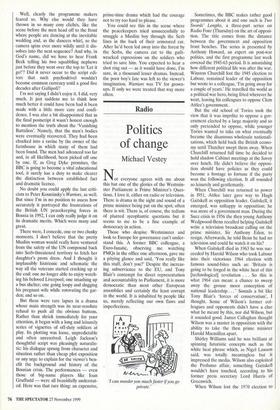Television
Winners and losers
James Delingpole
Warriors (BBC 1, Saturday and Sun- day) was undoubtedly one of the most bril- liant TV dramas this year and possibly one of the best of the decade, but I'm not sure that I ought to review it. What bothers me, you see, is that every time someone tries pointing out that the BBC's output is mov- ing inexorably downmarket, the BBC big- wigs will respond: 'We made Warriors, so there. Everybody said it was the best thing ever. So we're right and you're not!'
So, before I move on to Warriors, I thought I'd put the boot in to All The King's Men (BBC 1, the Sunday before last), just so that I can remind everyone of the editorial cowardice and ratings-chasing idiocy to which BBC drama is more com- monly prone.
Its first error was to cast David Jason in the lead. Though there was little wrong with his performance as Frank Beck, the head of the Sandringham estate who mys- teriously vanished with his men during the Gallipoli campaign, the fact is he can't help being TV's loveable shopkeeper's assistant/ grumpy detective/sarf London wide boy David Jason. He's too ubiquitous, too pop- ular. 'Yes, we know that the first world war was an awfully long time ago,' the pro- gramme's message seemed to be. 'But it's okay. You're in safe hands. We've got David Jason on board.' Are viewers really so stupid that they need this sort of com- fort-blanket? Well, clearly the programme makers feared so. Why else would they have thrown in so many cosy cliches, like the scene before the men head off to the front where people are dancing at the inevitable wedding and, as the dancers whirl, so the camera spins ever more wildly until it dis- solves into the next sequence? And why, in God's name, did we have to hear Frank Beck telling his two squabbling nephews just before they went over the top to 'Let it go!'? Did it never occur to the script edi- tors that such psychodrivel wouldn't become common currency until a good five decades after Gallipoli?
I'm not saying I didn't enjoy it. I did, very much. It just saddens me to think how much better it could have been had it been made with a little more care and confi- dence. I was also a bit disappointed that in the final postscript it wasn't honest enough to mention the truth about the 'Vanishing Battalion'. Namely, that the men's bodies were eventually recovered. They had been chucked into a ravine by the owner of the farmhouse in which many of them had been found. The men had advanced too far and, in all likelihood, been picked off one by one. If, as Greg Dyke promises, the BBC is going to become a vital educational tool, it surely has a duty to make clearer the distinction between established fact and dramatic licence.
No doubt you could apply the last criti- cism to Peter Kosminslcy's Waniors, as well. But since I'm in no position to assess how accurately it portrayed the frustrations of the British UN peacekeeping forces in Bosnia in 1992, I can only really judge it on its dramatic merits. Which were many and great.
There were, I concede, one or two clunky moments. I don't believe that the pretty Muslim woman would really have ventured from the safety of the UN compound back into Serb-threatened territory to fetch her daughter's prom dress. And I thought it implausibly histrionic and schematic the way all the veterans started cracking up at the end: one no longer able to enjoy watch- ing his beloved Liverpool; one smashing up a bus shelter; one going loopy and slugging his pregnant wife while rotovating the gar- den; and so on.
But these were rare lapses in a drama whose main strength was its near-resolute refusal to push all the obvious buttons. Rather than shriek immediately for your attention, it began with a long and leisurely series of vignettes of off-duty soldiers at play. Its plotting was loose, unpredictable and often unresolved. Leigh Jackson's thoughtful script was pleasingly naturalis- tic: his dialogue sprung from character and situation rather than cheap plot exposition or any urge to explain for the viewer's ben- efit the background and history of the Bosnian crisis. The performances — even those of big-name players like loan Gruffind — were all beautifully understat- ed. Here was that rare thing: an expensive, prime-time drama which had the courage not to try too hard to please.
You could see this in the scene where the peacekeepers tried unsuccessfully to smuggle a Muslim boy through the Serb lines in the back of their armoured car. After he'd been led away into the forest by the Serbs, the camera cut to the guilt- wracked expressions on the soldiers who tried to save him. You expected to hear a shot ring out — as it would have done, I'm sure, in a thousand lesser dramas. Inptead, the poor boy's fate was left to the viewer's imagination. Warriors was TV for grown- ups. If only we were treated that way more often.



























































































 Previous page
Previous page